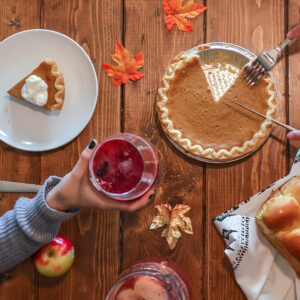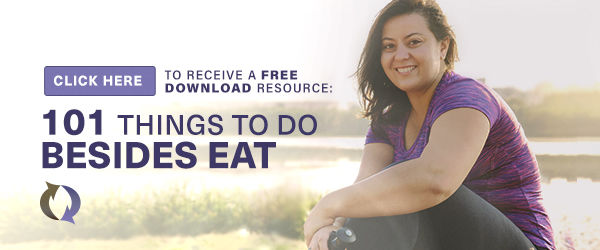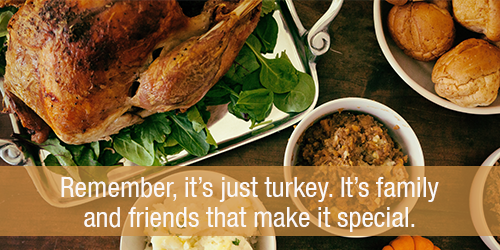Oh puleaaase! Not another “news” segment about how to cut 300 calories from your Thanksgiving dinner! (In fact, all those tips for holiday eating are so annoying!)
Cut 300 calories from your Thanksgiving dinner?
The common advice to cut 300 calories from your Thanksgiving meal by skipping the mashed potatoes or stuffing, eating low-fat gravy, and eating pumpkin pie instead of pecan pie completely misses the real issues people struggle during this particular meal.
In fact, for most people, it’s not about the food at all!
Reasons you might struggle with Thanksgiving
 You build up the anticipation for this special meal throughout the fall. However, when you sit down to eat, you might eat quickly and mindlessly, not paying attention to how your body is responding to the type or amount of food you are eating.
You build up the anticipation for this special meal throughout the fall. However, when you sit down to eat, you might eat quickly and mindlessly, not paying attention to how your body is responding to the type or amount of food you are eating.- You might deprive yourself of certain foods at other times, like potatoes or desserts. When Thanksgiving comes, you eat as much of these foods as you can.
- You might “save up” during the day, becoming overly hungry by the time you sit down to your meal. Being overly hungry is a common trigger for eating more than you need.
- Thanksgiving is associated with various emotional triggers for eating.
Don’t cut calories! Add these to Thanksgiving instead!
Instead of focusing on what to eliminate from your meal, how about focusing on what to add to your meal?
Gratitude for food and family
As the name implies, Thanksgiving is an opportunity to express our thanks. Yet this holiday often seems to be about the food instead!
There’s nothing wrong with connecting over a delicious meal. In fact, food is a great connector to our traditions, memories, our family and friends, and much more.
It’s important to remember the reason for the holiday, and pause to experience and express our gratitude for our food and family. And while a national holiday dedicated to thankfulness is wonderful, how would our lives change if we took a few moments to express gratitude every time we ate?
Freedom to eat what you love
When you lose the “good food, bad food” mentality, it is much easier to eat what you love without feeling guilty and driving your overeating cycle. When you recognize that all foods can fit in a balanced diet, it is much easier to choose foods that actually taste amazing, rather than eating them because they are usually forbidden.
Since Thanksgiving feels so special, you might forget that turkey and stuffing are available all year round! And if you really enjoy it, why not make your favorite pie for another meal?
There’s so much wonderful food, why bother eating foods that are just mediocre? Quality trumps quantity every time! (Read A Foodie’s Guide to Holiday Eating)
Awareness of hunger
It might be tempting to skip meals and ignore hunger to “save up” for the big meal. The result is feeling uncomfortably hungry before dinner and uncomfortably full afterward!
Instead, pay attention to your hunger rhythms so you can plan to be hungry but not famished. That includes consciously choosing how many and what kind of appetizers to eat before the meal, so you’ll have room for your favorites.
You’ll enjoy your meal even more if you’re hungry. As my grandmother used to say, “hunger is the best seasoning.”
Sometimes the meal is delayed, so if you realize you are overly hungry, remember that being really, really hungry doesn’t mean you need twice as much food as you usually eat. It just means you need to eat soon! Slow down your eating so you will recognize fullness before it’s too late.
Mindfulness
If you love Thanksgiving, act like it! Bring your full attention to the meal so it becomes a multisensory experience. Not only will you get more pleasure with every bite, but you’ll stay more connected to your body as you eat.
Awareness of satiety
It really helps to set your intention for how you want to feel after your meal. When you eat with the intention of feeling better when you’re done than you did when you started, you will stay more aware of satiety.
As you pay attention, you’ll notice that pleasure subtly diminishes with each bite and the potential for discomfort gradually increases. Can you eat mindfully enough to stop eating before you cross over that fine line?
If you overeat, there is no need for guilt. Instead, don’t miss the lesson! Here’s how: What to Do When You Overdo It
Updated from a previously published version.
Enjoyed this article? Here are three more to help you with holiday eating:
Rewrite Those Ridiculous Holiday Eating Tips
Three Ways to Handle Triggers for Holiday Overeating
Thankful for Food: The Great Connector


